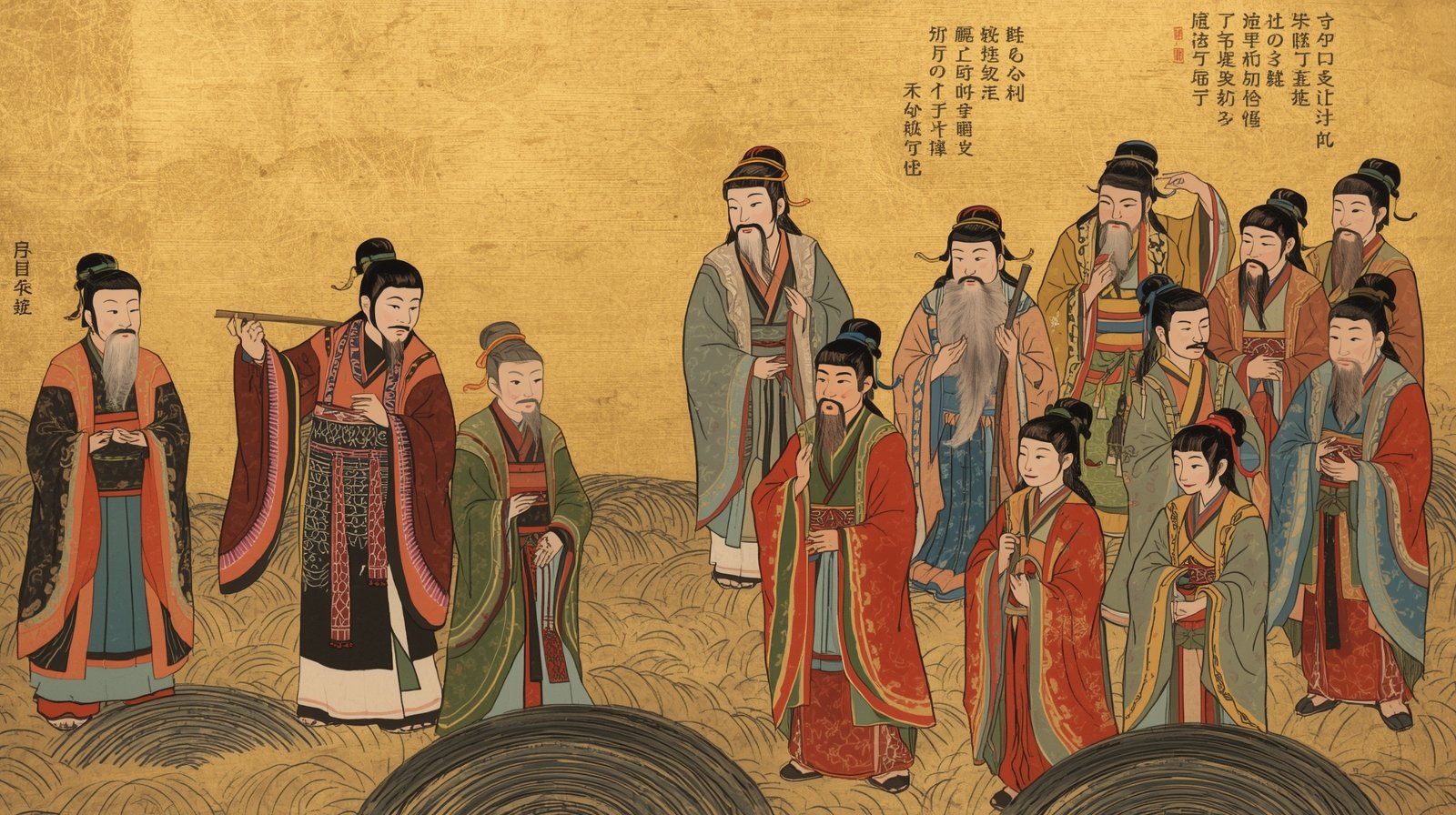The Question That Spans Millennia
Picture two graduation ceremonies separated by a thousand years. In one, proud parents watch their children receive diplomas that promise economic prosperity. In another, a young scholar recites ancient poetry at dawn, preparing to serve his empire through moral leadership. Both scenes celebrate education—yet they reveal fundamentally different answers to humanity’s enduring question: What does it mean to be truly educated?
Today’s world measures education through standardized metrics: graduation rates, test scores, and economic outcomes. Organizations like the OECD track that 14% of young adults lack upper secondary credentials, while UNESCO establishes global frameworks that reduce education to numbered levels. These tools serve important purposes, but they capture only the surface of a much deeper transformation.
Three remarkable civilizations offer us radically different visions of education—ones that challenge our modern assumptions and illuminate possibilities we’ve forgotten.
The Confucian Vision: Character as the Ultimate Curriculum
Imperial China built its entire educational philosophy around a revolutionary premise: knowledge without virtue creates dangerous leaders, while virtue without knowledge creates ineffective ones. Confucian educators didn’t simply teach students to memorize the Four Books and Five Classics—they guided them toward becoming junzi, exemplary human beings who embodied benevolence (ren), ritual propriety (li), and righteousness (yi).
This educational philosophy democratized learning in unprecedented ways. Confucian academies welcomed students regardless of birth, and the civil service examinations allowed commoners to rise to the highest positions through merit alone. Students spent decades not just acquiring knowledge, but transforming themselves into moral leaders capable of bringing harmony to society.
The educated person in this system didn’t pursue wealth or status—they cultivated the wisdom and character necessary to serve others. Success meant becoming the kind of person who could govern justly, resolve conflicts peacefully, and inspire virtue in others.
Key Insight: Confucian education treated moral development as both the means and the end of learning. Students didn’t study ethics as one subject among many—ethical transformation permeated every aspect of their education.
The Spartan Model: Forging Citizens Through Fire
In ancient Sparta, educators designed a completely different answer to the education question. The agōgē system stripped away everything we might consider “academic” to focus laser-sharp attention on physical strength, mental resilience, and unwavering loyalty to the community.
Seven-year-old boys left their families to begin a grueling regimen that lasted into their twenties. They endured hunger, cold, and constant physical challenges—not as punishment, but as curriculum. Every hardship served a purpose: building the unbreakable spirit and ironclad discipline that Spartan society demanded.
This education system produced citizens who could endure any suffering for the greater good. Students learned music and dance, but only as tools for military coordination. They studied enough reading and writing to function, but devoted their real energy to mastering combat, survival, and group cohesion.
The Spartan definition of an educated person would shock us today: someone who could sacrifice personal comfort, withstand any hardship, and place community needs above individual desires.
Key Insight: Spartan education reveals how powerfully a society’s survival needs shape its educational priorities. When existence depends on military strength, educators design systems that produce resilient warriors rather than creative thinkers.
The Islamic Golden Age: Curiosity Without Borders
Baghdad’s House of Wisdom during the Islamic Golden Age offers perhaps the most expansive vision of education in human history. Scholars like Al-Khwarizmi and Ibn Sina didn’t see knowledge as belonging to any single culture or discipline—they viewed it as a unified treasure that belonged to all humanity.
These educators actively sought out texts from Greece, Persia, India, and beyond, translating and synthesizing insights across languages and traditions. They refused to separate mathematics from philosophy, medicine from astronomy, or science from poetry. Students learned that every field of knowledge illuminated others, and that truth revealed itself through the intersection of diverse perspectives.
The House of Wisdom operated on a radical principle: curiosity drives human flourishing more powerfully than any other force. Educated people didn’t just master existing knowledge—they pushed constantly into uncharted intellectual territory, driven by an insatiable desire to understand their universe more deeply.
Key Insight: This model shows education at its most expansive—treating all knowledge as interconnected and viewing intellectual curiosity as humanity’s highest calling. The educated person becomes an eternal student of existence itself.
The Modern Paradox: Measurement Without Meaning
Today’s global education systems serve crucial functions that these historical models couldn’t address. The OECD’s data helps governments identify which students lack basic skills for economic participation. UNESCO’s International Standard Classification of Education (ISCED) enables countries to compare their systems and share best practices. These frameworks ensure that more children than ever before gain foundational literacy and numeracy skills.
Yet something essential gets lost in translation. When educators reduce education to measurable outcomes—test scores, graduation rates, employment statistics—they inadvertently narrow its transformative potential. A student can earn multiple degrees while remaining morally underdeveloped, physically weak, and intellectually boring.
Modern education excels at preparing workers but struggles to develop citizens. It creates specialists but often fragments knowledge. It promotes individual achievement while neglecting community responsibility.
Critical Insight: Our metrics capture education’s floor—basic competencies everyone should possess—but they fail to describe its ceiling—the heights of human development that education can facilitate.
The Synthesis: Weaving Ancient Wisdom into Modern Practice
Rather than choosing between historical models and contemporary approaches, we might weave their insights together into something more complete. Each tradition offers irreplaceable elements:
From Confucian China: Character development must remain central to education. Students need explicit training in ethical reasoning, community responsibility, and moral courage. Education should cultivate wisdom alongside intelligence.
From Ancient Sparta: Physical and mental resilience deserve serious attention in our increasingly comfortable world. Students benefit from controlled challenges that build grit, discipline, and the ability to persevere through difficulty.
From the Islamic Golden Age: Interdisciplinary curiosity and cross-cultural learning should guide curriculum design. Students need to see connections between fields of knowledge and understand how different cultural traditions illuminate universal truths.
From Modern Systems: Universal access, foundational skills, and systematic assessment ensure that education serves everyone, not just elites.
Toward a Richer Definition
True education transforms people in ways that transcend economic utility. It develops moral wisdom that enables ethical decision-making. It builds physical and psychological resilience that allows individuals to flourish despite adversity. It cultivates intellectual curiosity that drives lifelong learning and innovation. And it provides practical skills that enable meaningful participation in economic and civic life.
The most educated person isn’t necessarily the one with the most degrees or the highest income—it’s someone who has developed the full spectrum of human capabilities and uses them in service of their community and their own continued growth.
Questions for Our Time
As we design education for the 21st century, we might ask ourselves:
- How can we measure character development alongside academic achievement?
- What kinds of challenges should we design to build resilience without causing harm?
- How can we encourage intellectual curiosity in an age of information overload?
- What would education look like if we valued wisdom as much as intelligence?
The answer to “What does it mean to be educated?” continues evolving—but by learning from the past, we can craft educational experiences that honor both human potential and practical necessity. After all, the most profound education doesn’t just prepare us for jobs—it prepares us for life itself.



